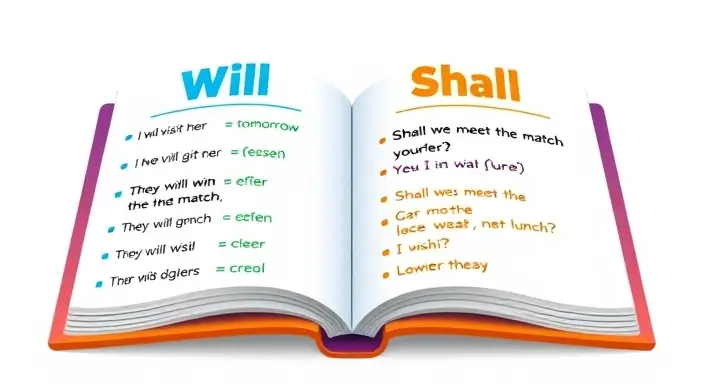Will and shall – Future
- Home ›
- Grammar ›
- A1 Elementary ›
- Will and shall – Future




Complete the sentences with I will (I’ll), Shall I or Shall we.
Complete the sentences with ‘ll (will), won’t or shall and the words in brackets. Use short forms of will when you can
Complete the sentences with ‘ll (will), won’t or shall and the words in brackets. Use short forms of will when you can

- 05 December, 2024
- 610
- Grammar
- A1 Elementary
Will and shall – Future
Will
"Will" is a modal auxiliary verb used to talk about the future. It's simple to use and very common in English.
Rules for using "Will":
- Positive Sentences: Use "will" + base form of the verb to talk about future actions.
I will study tomorrow.
She will visit her grandmother next week. - Negative Sentences: Use "will not" (or "won’t") to make a negative statement about the future.
I won’t go to the party.
He will not play football tomorrow. - Questions: Place "will" before the subject to ask questions about the future.
Will you call me later?
Will they arrive on time? - Short Answers: Use "Yes, [subject] will" or "No, [subject] won’t" in replies.
Yes, I will.
No, I won’t.
Uses of Will
- Predictions: Use "will" to talk about things you think will happen in the future.
It will rain tomorrow.
They will win the game.
They will doesn’t win the game. - Promises and Refusals: Use "will" to make promises or refuse something.
I will help you with your homework.
I will not helps you. - Instant Decisions: Use "will" for decisions made at the moment of speaking.
I’ll answer the phone!
I’ll go to the shop now.
Shall
"Shall" is less common but still used in modern English, especially in British English. It is mostly used with "I" and "we."
Rules for using "Shall":
- Offers: Use "shall" when offering to do something.
Shall I help you with your bags?
Shall I make some tea? - Suggestions: Use "shall" to make polite suggestions.
Shall we go to the park?
Shall we watch a movie tonight?
Note: In informal contexts, "will" is more common for these uses.
I’ll make some tea.
Key Differences Between Will and Shall
| Will | Shall |
|---|---|
| Used for all subjects. | Common with "I" and "we." |
| Talks about promises, predictions, and decisions. | Makes suggestions or offers. |
| Example: I will call you tomorrow. | Example: Shall we meet later? |
Common Mistakes
- Incorrect negative form:
He won’t goes to school.
He won’t go to school. - Incorrect placement of "will":
Will you going to the party?
Will you go to the party?
Unfortunately, we currently do not have teaching materials available on this topic. We are working with all our efforts to prepare it. You can subscribe to Verbooze to be notified once the teaching materials are ready.




English Learning Made Easy & Accessible for Everyone
Boost your English skills with interactive lessons, grammar explanations, reading and listening exercises, and real-time feedback. Join our growing community and start improving today — all completely free!
